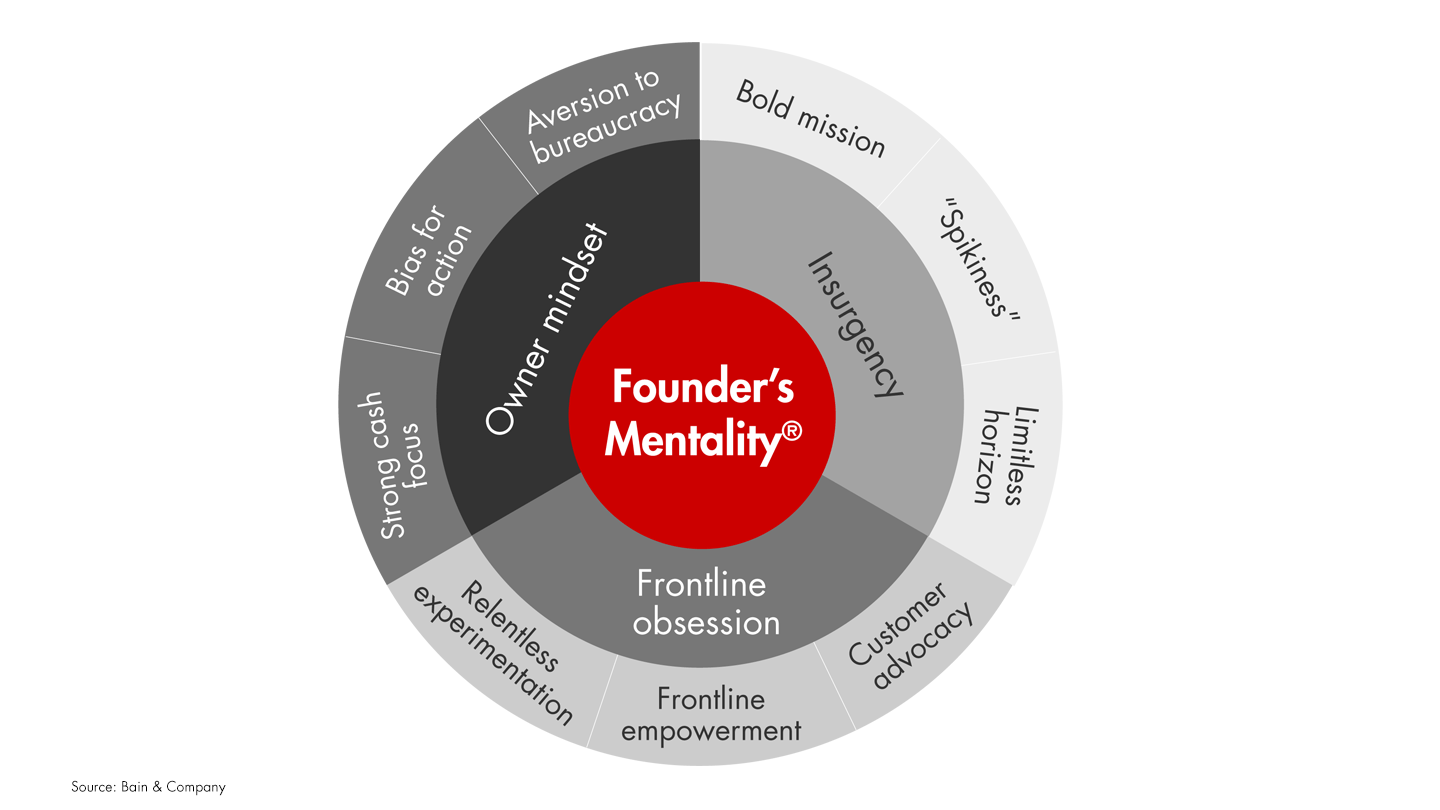Founder's Mentality Blog
Companies with high Founder’s Mentality have an extraordinary sense of insurgency, a frontline obsession and an owner mindset. Within those three overarching elements are nine sub-elements (see Figure 1), and it is within those elements that the richness of the Founder’s Mentality truly comes to life.


We see these traits time and again among the members of the Founder’s Mentality 100 (FM100). The FM100 is Bain’s initiative to assemble some of the top insurgents in the world into a single forum to co-create solutions to what we call the growth paradox: Growth creates complexity, and complexity kills growth. As we did last year, we’re wrapping up the year by drawing on lessons gathered from the FM100. This year, we focus on further defining the elements of Founder’s Mentality by illustrating them with examples from the FM100, starting with insurgency.
Insurgency typically comprises three elements:
- The team is at war against their industry on behalf of underserved customers. This means every employee understands the company’s bold mission (the subject of our most recent blog), and can answer the big “why?”—“Why does the company exist?”
- The leadership team embraces “spiky” capabilities—being world class at those things that really matter for customers and decidedly average at the rest.
- The leaders have a limitless horizon, refusing to be defined by or constrained within the industry in which they first competed.

About the Founder's Mentality
The three elements of the Founder's Mentality help companies sustain performance while avoiding the inevitable crises of growth.
Let’s take a look at the second of these insurgent traits: spikiness.
The insurgency of great companies is not simply an aspirational mission—it is backed up by extraordinary capabilities that actually enable the company to deliver a better product or service to its customers. But these companies aren’t good at everything—they spike. They are exceptional at a couple of things and average at the rest. The notion of a balanced scorecard is rejected here: Competitiveness comes from sticking to what the company is great at and focusing resources ruthlessly on these few spikey capabilities. Here again, our blogs are filled with FM100 examples (such as Yonghui and Oberoi), but let’s focus on one: The restaurant chain Nando’s, a FM100 member from South Africa, whose founder is obsessed with making sure the company spikes around those who make chicken.
Robbie Brozin founded Nando’s in 1987 and has grown it into one of the world’s best chicken restaurant chains, with more than 1,200 restaurants in 23 countries. Robbie tells us about his maniacal focus on maintaining spikiness:
“In our industry, all the talk was about fast, cheap food. I remember folks telling me that if we can’t cook our chicken within three minutes we were doomed. But we rejected that thinking. We argued that the quality of our chicken will be remembered long after the wait is forgotten. For us the insurgency was all about the people who make the chicken. From the chicken farmer to the griller. These are the heroes of our business. … We had a meeting on supply chain and we were doing amazing things to upgrade our capabilities, but we weren’t talking enough about where we really spike. We can be good at a lot of aspects, but if we’re not great, if we’re not the best company that ever existed around our supplier relationships, the rest doesn’t matter. … I feel that my job is to stay a bit paranoid, to make sure we don’t forget the basics as we work to build a great company. Our business is pretty simple and, at its most basic, we are successful when we make the heroes of the business those who make chicken. We must celebrate our suppliers, our grillers, our serving staff who get a warm, beautiful chicken to our customers. But in a world of complexity, where initiatives pile on initiative, I feel a key role I can play is to be the voice of the insurgency. I can do this as a board member and as a coach and mentor of our people—to make the world a better place, one chicken at a time.”
With people in their companies demanding that they give various initiatives the time and resources required to be world class, it is no wonder CEOs sometimes lose sight of the “spikes.” If you’re a CEO, your agenda is tightly packed. Everyone wants a voice and a few more resources to be a bit better. But spikiness matters. Your customers don’t want you to be balanced; they want you to be great at a few things. Your people didn’t join your company to be good enough at a lot of things; they joined you to be great at the few things that keep you the insurgent, the revolutionary.
The acid test for any CEO is this: In the few big competitive battles, are you confident you are deploying far more resources than your biggest competitor? For many CEOs, the answer is no. They know they are allocating lots of resources to lots of different things, but worry constantly that they are underresourced on the battles that matter. They need to rediscover their spikiness before they drift into mediocrity, before they join the long list of businesses that suffer from “satisfactory underperformance.”